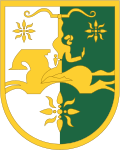
Abkhazia
States with embassy in Abkhazia
States with representative office in Abkhazia
States with non-resident embassy to Abkhazia

This article lists the diplomatic missions in Abkhazia. Abkhazia broke away from Georgia after a war that lasted from August 1992 to September 1993. After the 2008 South Ossetia war Abkhazia was further recognised by Russia, Nicaragua, Venezuela, Nauru, Donetsk People's Republic [a] , Luhansk People's Republic [a] , and Syria. Of these, South Ossetia and Russia have established embassies in Abkhazia, both in the capital, Sukhumi. Venezuelan and Nicaraguan ambassadors reside in Moscow.
